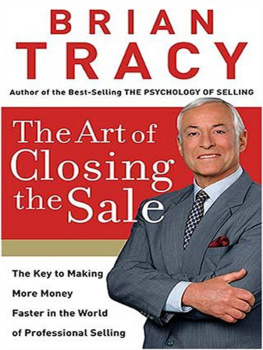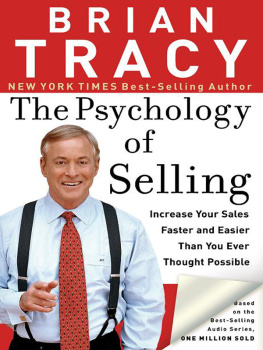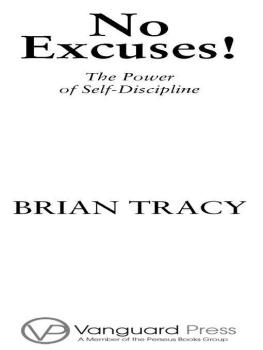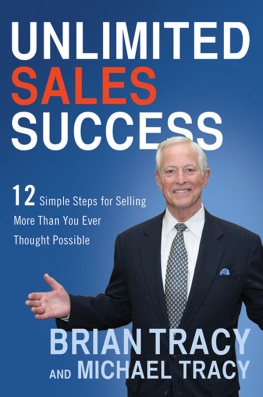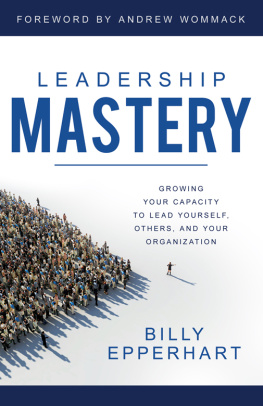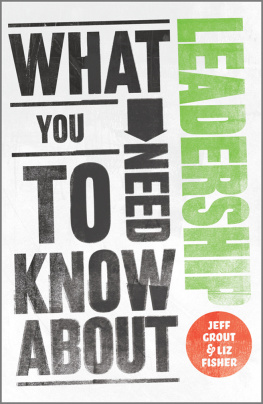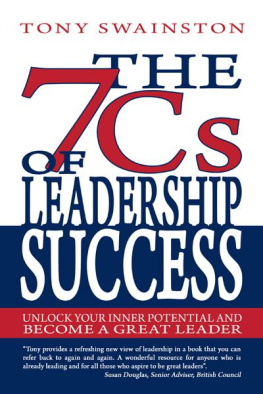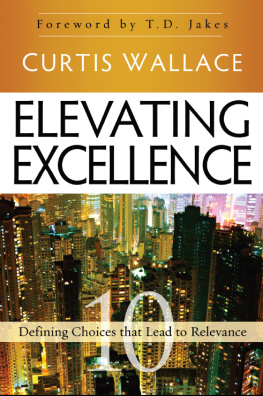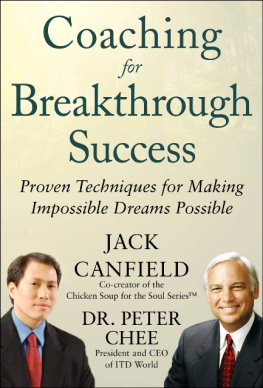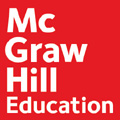
Copyright 2013 by Brian Tracy and Peter Chee. All rights reserved. Printed in the United States of America. Except as permitted under the United States Copyright Act of 1976, no part of this publication may be reproduced or distributed in any form or by any means, or stored in a database or retrieval system, without the prior written permission of the publisher.
ISBN: 978-0-07-180947-4
MHID: 0-07-180947-3
The material in this eBook also appears in the print version of this title: ISBN: 978-0-07-180946-7, MHID: 0-07-180946-5.
All trademarks are trademarks of their respective owners. Rather than put a trademark symbol after every occurrence of a trademarked name, we use names in an editorial fashion only, and to the benefit of the trademark owner, with no intention of infringement of the trademark. Where such designations appear in this book, they have been printed with initial caps.
McGraw-Hill Education eBooks are available at special quantity discounts to use as premiums and sales promotions, or for use in corporate training programs. To contact a representative please e-mail us at bulksales@mcgraw-hill.com.
TERMS OF USE
This is a copyrighted work and McGraw-Hill Education and its licensors reserve all rights in and to the work. Use of this work is subject to these terms. Except as permitted under the Copyright Act of 1976 and the right to store and retrieve one copy of the work, you may not decompile, disassemble, reverse engineer, reproduce, modify, create derivative works based upon, transmit, distribute, disseminate, sell, publish or sublicense the work or any part of it without McGraw-Hill Educations prior consent. You may use the work for your own noncommercial and personal use; any other use of the work is strictly prohibited. Your right to use the work may be terminated if you fail to comply with these terms.
THE WORK IS PROVIDED AS IS. McGRAW-HILL EDUCATION AND ITS LICENSORS MAKE NO GUARANTEES OR WARRANTIES AS TO THE ACCURACY, ADEQUACY OR COMPLETENESS OF OR RESULTS TO BE OBTAINED FROM USING THE WORK, INCLUDING ANY INFORMATION THAT CAN BE ACCESSED THROUGH THE WORK VIA HYPERLINK OR OTHERWISE, AND EXPRESSLY DISCLAIM ANY WARRANTY, EXPRESS OR IMPLIED, INCLUDING BUT NOT LIMITED TO IMPLIED WARRANTIES OF MERCHANTABILITY OR FITNESS FOR A PARTICULAR PURPOSE. McGraw-Hill Education and its licensors do not warrant or guarantee that the functions contained in the work will meet your requirements or that its operation will be uninterrupted or error free. Neither McGraw-Hill Education nor its licensors shall be liable to you or anyone else for any inaccuracy, error or omission, regardless of cause, in the work or for any damages resulting therefrom. McGraw-Hill Education has no responsibility for the content of any information accessed through the work. Under no circumstances shall McGraw-Hill Education and/or its licensors be liable for any indirect, incidental, special, punitive, consequential or similar damages that result from the use of or inability to use the work, even if any of them has been advised of the possibility of such damages. This limitation of liability shall apply to any claim or cause whatsoever whether such claim or cause arises in contract, tort or otherwise.
This book is fondly dedicated to Joe Traina, one of the finest and most excellent leaders I have ever known. His ability to achieve outstanding business results in the face of every adversity is a continuous inspiration to everyone who knows him.
B.T.
To Eunice and Adelina for bringing out the best leader in me and for your everlasting love.
P.C.
CONTENTS
INTRODUCTION
Leaders establish the vision for the future and set the strategy for getting there.
John P. Cotter
Your ability as a leader to master the 12 Disciplines of Leadership Excellence explained in this book can do more to help you rise to the top of your field than perhaps any other single factor.
Self-discipline is the essential quality for success in any endeavor. After 22 years of interviews and research into the 500 richest and most successful men in America, Napoleon Hill concluded that self-discipline was the Master Key to Riches. With self-discipline, everything is possible. But without self-discipline, virtually nothing is possible.
The leadership disciplines described in this book are learned qualities that require tremendous determination and persistence to develop and maintain. The good news is that each of these disciplines is learnable with repetition and practice. As Goethe wrote, Everything is hard before it is easy.
The development of an essential discipline is hard work and more hard work initially, involving two steps forward and one step back. But once you have developed a particular discipline, it becomes automatic and easier to practice throughout your career.
Self-discipline is the essential quality of characterthe ability to withstand the temptation to compromise in any area. It is the true test of the person you have become to this date. Is it worth it? Jim Rohn wrote, Discipline weighs ounces; regret weighs tons. Al Thomsick, the teacher and trainer, once wrote that Success is tons of discipline.
Develop a Long Time Perspective
Dr. Edward Banfield of Harvard conducted more than 50 years of research into the reasons for upward socioeconomic mobility in the United States and in other countries. He concluded that the most important single factor to predict success was what he called long-term perspective. He defined long-term perspective as the ability to think forward into the future, and then to come back to the present day, the present moment, and use that future vision or goal as a criterion against which to measure present actions or decisions.
Leaders have a long time perspective. They project forward 1, 2, 3, 5, and even 10 or 20 years into the future when deciding on a current course of action. They take the time to carefully consider the potential consequences of an act or a behavior before they engage in it. They practice back-from-the-future thinking.
Denis Waitley, the business speaker, wrote about top people and time perspective by saying that, They plant trees under which they will never sit. The difference between a politician and a statesman is that the politician plans for the next election; the statesman (or woman) plans for the next generation.
One of the top business books of the 1990s, Competing for the Future, by Gary Hamel and C. K. Prahalad, said that the major job of the executive or leader was to determine the future intent or long-term goals for the business. They said that clarity about future intent sharpens and improves current decision making.
Peter Drucker said that the primary job of the executive was to think about the future, because no one is tasked with this responsibility.
Milton Friedman wrote, The quality of your thinking is determined by the accuracy of your ability to predict the long-term consequences of your current actions.
Henry Hazlitt, the economist, said that the ability to determine the secondary consequences of your actions is essential to good decision making.
Self-Discipline Is a Learnable Quality
Many people feel that they lack self-discipline in certain areas and they often assume that, Thats just the way I am. Are some leaders born with natural qualities and abilities that make self-discipline easy for them? Peter Drucker addressed this question when he said, There may be such a thing as natural-born leaders, but there are so few of them that they make very little difference in the great scheme of things. He went on to say that Leaders are made by development, primarily self-development.


